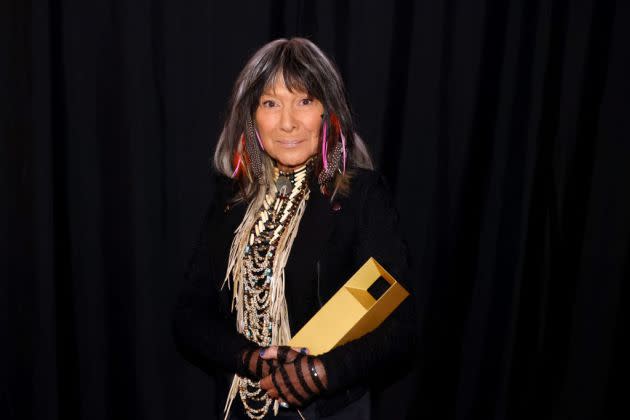Buffy Sainte-Marie, Academy Award-Winning Songwriter, Has Indigenous Roots Questioned In CBC Report
- Oops!Something went wrong.Please try again later.
- Oops!Something went wrong.Please try again later.

A detailed investigation by the Canadian Broadcasting Corporation has raised questions about the indigenous persona of singer/songwriter Buffy Sainte-Marie.
Sainte-Marie has been feted as the first Indigenous person to win an Academy Award for cowriting the song Up Where We Belong for the film An Officer and a Gentleman.
More from Deadline
Sainte-Marie, 82, has claimed that she was born on Tribal land and adopted by white parents. The CBC countered that in a report published Friday and in an accompanying episode of the documentary series The Fifth Estate. The media outlet obtained a birth certificate saying Sainte-Marie was born to parents of European ancestry in Massachusetts.
The CBC reported that the birth certificate from Stoneham, Mass. showed “Beverly Jean Santamaria” and her parents listed as white. The CBC said it had the document authenticated by Stoneham town clerk Maria Sagarino.
Sainte-Marie, alerted to the revelations that would be coming, issued a statement posted to social media Thursday.
“I am proud of my Indigenous-American family, and the deep ties I have to Canada and my Piapot family,” Sainte-Marie wrote. The Piapot are the Cree family that officially adopted her as a young adult in the ’60s.
She added, “My Indigenous identity is rooted in a deep connection to a community which has had a profound role shaping my life and my work.” She added that the CBC allegations “forced me to relive and defend my experience as a survivor of sexual abuse, which I endured at the hands of my brother,” Alan St. Marie.
The CBC’s report said Sainte-Marie did not raise such allegations against her brother until he started disputing her claims of Indigenous ancestry in correspondence with various media outlets (including the Denver Post and PBS public radio) in the early ’70s. Sainte-Marie herself raised the brother’s claims in her 2018 autobiography. The brother died in 2011.
The CBC said newspaper reports from the beginning of Sainte-Marie’s musical career in 1963 found that “in the space of those 10 months, she was referred to as Algonquin, full-blooded Algonquin, Mi’kmaq, half-Mi’kmaq, and Cree.”
The CBC’s expert source, lawyer and “Indigenous identity fraud” expert Jean Teillet, said these mix-ups are hardly incidental, since those nations hail from different parts of Canada. The Mi’kmaq live on the East Coast, Algonquin people are from Ontario and northern Quebec, and Cree people are primarily from the prairies.
The allegations against Sainte-Marie recall those made against Sacheen Littlefeather, the activist who declined Marlon Brando’s Oscar on stage in 1973.
My Truth As I know it – Buffy pic.twitter.com/CZjBMOcKP9
— Buffy Sainte-Marie (@BuffySteMarie) October 26, 2023
Best of Deadline
SAG-AFTRA Interim Agreements: Full List Of Movies And TV Series
2024 Presidential Election Debate Schedule: Dates, Times, Who'll Be There And Who Won't
2023 Premiere Dates For New & Returning Series On Broadcast, Cable & Streaming
Sign up for Deadline's Newsletter. For the latest news, follow us on Facebook, Twitter, and Instagram.

